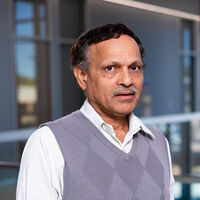Professor, Cellular and Molecular Biology
Phone: 903.877.7668
Email: sreerama.shetty@uttyler.edu
Department: Cellular and Molecular Biology
Popular Searches

Professor, Cellular and Molecular Biology
Phone: 903.877.7668
Email: sreerama.shetty@uttyler.edu
Department: Cellular and Molecular Biology
Dr. Shetty joined the faculty in 1997 as an Assistant professor in the Department of Medicine and is currently serving as a Professor of Cellular and Molecular Biology.
Dr. Shetty and his colleagues have published 99 papers, including publications in AJRCCM, Science Translational Medicine, MCB, JCI Insight and JBC. His research is focused mainly on molecular mechanisms of regulation of gene expression by tumor suppressor protein, p53 and caveolin-1 (Cav1) and their role in lung epithelial injury and lung remodeling. His major research interests are chronic lung diseases such as pulmonary fibrosis (PF), chronic obstructive pulmonary disease (COPD) and SARS-CoV2-induced lung injury and remodeling. Development of peptide (CSP7)-, recombinant protein- and monoclonal antibody-based (biological) interventions to treat PF, COPD and post-CoV2-induced lung injury and fibrotic remodeling. This work has been continuously supported by NIH (NHLBI and NIEHS), FAMRI, AHA and DoD for twenty-five years.
Using a bench-to-bedside approach, his colleagues sought to translate and commercialize our Lab’s basic research to novel clinical therapies for IPF, COPD and post-CoV2 lung injury and PF through start-up biotechnology companies formed by UT system and UTHSCT. Phase 1 (NCT04233814) clinical trial of CSP7 (also called LTI-03) was recently completed in preparation for eventual treatment of patients with IPF. A follow-up phase-1b international clinical trial of a dry powder formulation of CSP7 in patients with IPF is initiated in January 2023.
While Biotech start-ups are commercializing CSP7 and other newer interventions for treatment of IPF, COPD and other lung diseases they will continue their work focusing on translational science to explore and elucidate novel mechanism(s) by which the protective effects of CSP7- and other newer recombinant protein-, peptide- and monoclonal antibody-based interventions against PF, COPD and post-CoV2 lung injury and lung remodeling are achieved, potentially enabling even better targeted interventional possibilities.
Education and Training
Postdoctoral Res Associate/Instructor, Department of Medicine, University of Texas
Health Center, Tyler, TX (1993-1995).
Postdoctoral Research Associate, Molecular Biology, Center for Cellular Mol Biol,
India (1991-1993).
PhD, Biosciences, Mangalore University, Mangalore, India (1991).
MS Biosciences Mangalore University, Mangalore, India (1986).
BS Mangalore University, Mangalore, India (1984).
Courses Taught
BIOT 5221 Protein & Nucleic Acids
BIOT 6311 RNA Structure, Function & Biotechnology
Research Interests
COPD, lung fibrosis, lung epithelial biology and airway and alveolar remodeling. Posttranscriptional gene regulation of expression by mRNA binding proteins. Development of recombinant protein, peptide and antibody interventions for treatment of COPD and idiopathic pulmonary fibrosis (IPF)/interstitial lung diseases and COVID-19. Airway and systemic drug delivery, pharmacokinetics and toxicology of peptide, recombinant protein, and monoclonal antibody therapeutics. A phase 1a trial of CSP7 has been successfully completed in 2022 and Phase 1b trial in patients with IPF patients is initiated in January 2023.
Publication Highlights